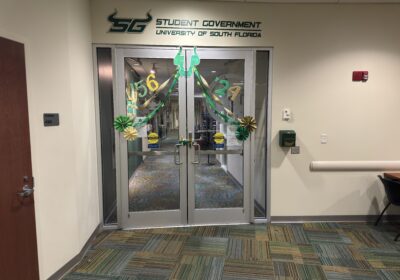USF tells incoming freshmen ‘It’s On Us’

This summer, USF added an ‘It’s On Us’ to its orientation session for incoming freshmen.
The presentation, led by Joni Bernbaum (pictured), aims to teach students about sexual assault awareness and prevention. ORACLE PHOTO / CHRISTOPHER COLLIER
It’s On Us is a national program opening the subject of campus sexual assault for discussion — a discussion now starting before students even have their first day of class.
New to this summer’s first-year student orientation sessions, “It’s On Us” is an hour-long presentation by the USF Center for Victim Advocacy and Violence Prevention seeking to place the responsibility of sexual assault prevention in the hands of entering students by educating them on the differences between rape and consensual sex.
“Consent is intelligent, it’s knowing, it’s voluntary, it’s not incapacitated due to drugs or alcohol,” said Joni Bernbaum, assistant director at the Center for Victim Advocacy and Violence Prevention.
In order to begin a serious conversation about sexual assault, Bernbaum said the stigma of sexual acts in and of themselves must be eliminated first.
“Sex is between two or more consenting partners … and to take the taboo off of that,” she said. “Sex is very different than rape — rape is when one person cannot or does not consent. It’s always about power and control, always.”
At each orientation session this summer, hundreds of incoming freshmen will hear the presentation in the Marshall Student Center.
According to a 2014 analysis of data from 2010-2012 by The Washington Post, the rate of sexual assault and battery on college campuses across the country is rising.
USF Tampa was in the middle with 17 reported cases of forcible sexual offenses across the three-year inquiry. Pennsylvania State University and Harvard University were the leading universities with this problem, suffering 84 and 83 incidents, respectively.
The lecture featured a variety of videos depicting situations that could lead to assault and ways of extinguishing them, with bystander intervention techniques such as distracting the aggressor, delegating the intervention to the police or to a larger group of people or directly confronting the aggressor.
“One of the really exciting things about USF is that we’ve been doing prevention and education and awareness events for years,” Bernbaum said.
Bernbaum stressed how the Center offers a variety of help for victims, whether that help is medical, legal, academic or otherwise.
“We will help work with them. Whether it’s in our office, whether it’s the Counseling Center, we have a support group,” Bernbaum said. “Whatever that person might need, we will help them work through it or (the Center can be) just an additional safe space.”
A sexual assault victim has 120 hours — not 72 — after the crime to get a forensic medical exam at the Crisis Center of Tampa Bay that will preserve evidence. At the lecture, Bernbaum stressed this detail, as hospitals and police stations do not perform that test without severe injury requiring emergency medical attention.
“Does this person need to file an injunction for protection or a restraining order? We can help do that,” Bernbaum said. “Is this case going to go to court? We will accompany people to court, work through trials. Do they want to file a report with Student Rights and Responsibilities? We’ll help them do that, so we will help them navigate through any and all legal stuff.”
“We’ll do anything and everything. You can come into our office and cry for five minutes and never see us again and tell us your name is Joe Schmo,” Bernbaum said. “To working with people for up to four years or whatever depending on what’s going on.”
According to WhiteHouse.gov, one in five women has been sexually assaulted while in college. The costs associated with sexual assault are $87,000 to $240,776, which includes quality of life loss, judicial proceedings, medical services and loss of productivity.
The fear of getting into trouble for underage consumption of alcohol, along with trauma, is one of the proposed explanations for why students don’t report assault. Bernbaum said the Center will not report cases of underage drinking to the police in the event of a sexual assault. The Center, she says, puts the victim first.







